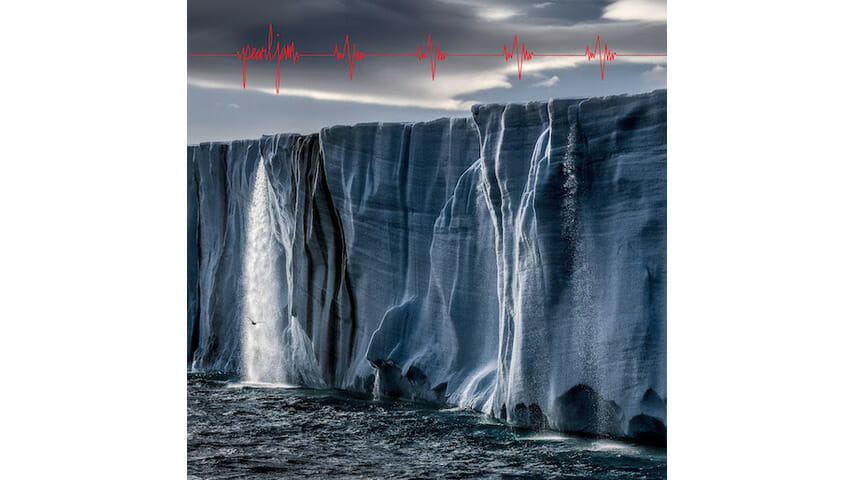Gigaton Is Pearl Jam’s Most Adventurous Album in Forever
It's the rare late-career Pearl Jam album that actually summons some real urgency
Music Reviews Pearl Jam
Pearl Jam fans know the drill by now. Every three or four years, the band’s promotional engine grinds into gear. There’s a new LP on the horizon, maybe a promising single, rumors that it might be the band’s best since Riot Act or what-have-you. You get your hopes up—and then comes another batch of studiously professional, bloodless rockers. The band’s concerts remain sprawling and impassioned spectacles, but its recorded output in recent years has been dismal, razed of the eccentricities that made Vitalogy and No Code so, well, vital. And each time the cycle arrives, the gap between albums is a little longer, the arena audiences are a little grayer, several more of Eddie Vedder’s grunge contemporaries have left us and Nirvana’s catalog’s seems a little more immaculate in retrospect.
This time, something seemed different. For one thing, the gap between Pearl Jam’s 10th album, 2013’s Lightning Bolt, and its 11th stretched to an interminable six-and-a-half years: enough time for the world to fundamentally shift and for a fascist administration to sink its spray-tan tentacles into every spare moment of national consciousness. (Nothing spells “crumbling empire” quite like dropping an album into a global pandemic severe enough to halt your planned arena tour.)
For another, the album was preceded by “Dance of the Clairvoyants,” a deliriously funky first single in which Vedder swaps his copyrighted croon for a paranoid yelp. I don’t know what’s odder—the fact that the song is an uncanny approximation of Fear of Music-era Talking Heads or that Pearl Jam pulls it off. It’s the band’s best and most surprising single in more than a decade, an unexpected stylistic guise from a band that seems to have receded from experimentation soon after it receded from the mainstream eye.
Much of Gigaton lives up to that promise—which is not to say this is Pearl Jam’s long-awaited jittery dance-rock album (no, God no) but that it does contain the band’s most adventurous and engaged material in several presidential administrations. The first four songs alone are a revelation of sustained focus and fury. The ambient hum that opens the record is a red herring, quickly exploding into the punkish snarl of “Who Ever Said.” Next comes “Superblood Wolfmoon,” a ferocious and hooky rocker highlighted by Vedder’s wordless call-and-response scatting and Mike McCready’s Van Halen-esque shredding.
The aforementioned “Dance of the Clairvoyants” crystalizes the album’s nervous energy with a stiff backbeat and some of Vedder’s more surrealist proclamations (“I’m in love with clairvoyants / Cuz they’re out of this world”). And the frantic travelogue “Quick Escape” is highlighted by some industrial-grade guitar machinations and Vedder’s screams in the chorus. Its swaggering intensity is almost comparable to Yield’s “Do the Evolution” or Vitalogy’s “Spin the Black Circle.”
Historically, Pearl Jam is purposeful when it has a malevolent villain to rail against, whether it be youth cruelty (“Jeremy”), Ticketmaster, George W. Bush (“Bu$hleaguer”) or some frightening insects (“Bugs”). Here, the famously liberal Vedder’s mood is understandably darkened by the demagogue in the White House, and he’s unafraid to get specific. During “Quick Escape,” he describes crisscrossing the world “to find a place Trump hadn’t fucked up yet.” On the airily optimistic “Seven O’Clock,” Vedder calls for action (“this fucked up situation calls for all hands”) and delivers some Twitter-worthy wordplay at the insulter-in-chief’s expense: “Sitting Bull and Crazy Horse come forged the north and west / Then there’s Sitting Bullshit as our sitting president.”
Elsewhere, Vedder’s lyrics tend towards hopeful platitudes, vague enough to slot right in with his stump speech should he decide to join the 2020 Democratic primary: “Firstly do no harm / Then put your seatbelt on,” “Look around at the promise now / Here and now,” “I won’t give up on satisfaction,” etc. You can’t be surprised that a band whose continued existence is itself a miracle of resilience preaches a survivalist ethos these days. It’s the message that pours through on “River Cross,” the spare, organ-led hymnal that closes the album with a call to remain strong amidst a “government [that] thrives on discontent.”
It would be impressive if Gigaton retained the thrill and invention of its first half, but that’s a tall order. There are invariably duds mixed amongst its 57-minute runtime, particularly the uninspiring rock-radio crunch of “Take the Long Way” and the open-mic tedium of “Comes Then Goes,” Vedder’s Lost Dogs-style acoustic spotlight. “Alright” is another eyebrow-raising off-brand excursion, but its fusion of pitter-patter electronica and plodding rock balladry doesn’t quite gel. Still, the closing punch of “Retrograde” and “River Cross” redeems things, and there’s nothing egregious enough here to complicate the album’s stature as Pearl Jam’s best in a generation.
If you need more proof that the world has been thrown off its axis lately, here it is: Pearl Jam went and made a good album—their best, I think, since Riot Act or perhaps even Binaural. Avocado apologists will disagree, but whereas Avocado constituted a faceless approximation of what urgent rock music ought to sound like, Gigaton is the rare late Pearl Jam record that actually summons some urgency. Now wash your hands so the band can reschedule its tour.
Revisit Pearl Jam’s 1991 Tower Records set: